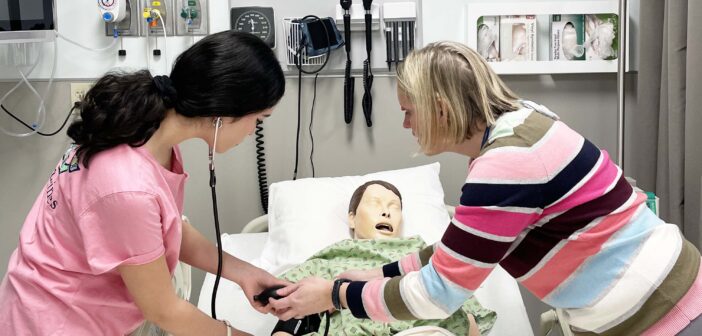Lehigh has long been committed to the safety of its students through emergency medical services (EMS). According to Lehigh’s EMS website, the Lehigh University Response Team (aLURT) charter was approved by the university in 1990 and began its service in 1991. Today, students, faculty, staff and alumni can train and volunteer with LUEMS to support the campus community.
Lehigh students now have the opportunity to collaborate with Moravian University students in an EMS course designed to prepare students with the professional skills to provide efficient assistance in emergency medical situations.
The course is currently in its third year of operation. According to the program’s website, 12 students were enrolled in spring 2022 and 15 were enrolled in spring 2023.
The course operates out of Moravian, which has a dedicated simulation center where students can practice on high-tech mannequins and use the skills they have learned in the course on standardized patients. The course is partnered with St. Luke’s Hospital to provide students with clinical experiences with hospital patients and in ambulances.
Dr. Ellen Payne, a professor and interim director of clinical education at Moravian, is the instructor of the EMS course. She has been an EMT since high school, and when she saw that Moravian was running a course on the subject, she was thrilled. Payne said she became the course instructor to guide students into the roles of prehospital and healthcare providers.
Lauren Shebby, ‘24, is currently enrolled in the course. She said the structure of the class involves attending classes at Moravian twice a week between 6 and 10 p.m. The class hours are mandatory to take the National Registry of Emergency Medical Technician Exam, which is required for an EMT certification in Pennsylvania.
Shebby said to prepare for this exam, students in the course study a given textbook, take quizzes in class and often practice with one another.
Aisleigh Hopkins, ‘26, is also a student in the course and heard about the program through LUEMS.
Hopkins said the only difficult part of joining the course was getting the cross-curricular credits transferred to Lehigh. She said once she found the right people to talk to, it was an easy process.
Each EMT program is different, which means the cost differs as well. For Shebby, the benefit of the Moravian program was how inexpensive it was compared to other EMT programs in the Bethlehem area.
“If you apply for the class, they will give you a cost breakdown,” Shebby said. “It’s a bunch of little fees. If you are paying for Lehigh tuition, it falls under that because it’s through the private Lehigh Valley college network.”
Shebby said since she pays tuition as a full-time student, the main costs she had to cover were a $100 course fee and her own drug and tuberculosis tests.
The course includes testing vital signs and administering CPR to practice learning alongside hospital doctors and nurses.
Rachel Joh, ‘25, earned her CPR certification in the EMS course and said she gained hands-on experience working in the medical field.
“Where else would I learn all of these skills?” Joh said. “The instructors were descriptive about everything, and they talked about real cases they’ve been in, which is interactive.”
Sophia Smith, ‘26, also learned about the course through LUEMS and said she joined as an “explorer.”
Smith said she is excited to continue her EMS studies, and this course has helped her create goals for her future.
“I’m hoping that when I’m done with this course, I can get a job as an EMT in the Bethlehem area,” Smith said.
By providing comprehensive training, the course allows students to pursue a career in healthcare with existing practical experience and knowledge.
“I think (the program) is really important for anybody,” Payne said. “They’ll always remember the experience and be an advocate for free hospital care and pre-hospital providers.”






Comment policy
Comments posted to The Brown and White website are reviewed by a moderator before being approved. Incendiary speech or harassing language, including comments targeted at individuals, may be deemed unacceptable and not published. Spam and other soliciting will also be declined.
The Brown and White also reserves the right to not publish entirely anonymous comments.